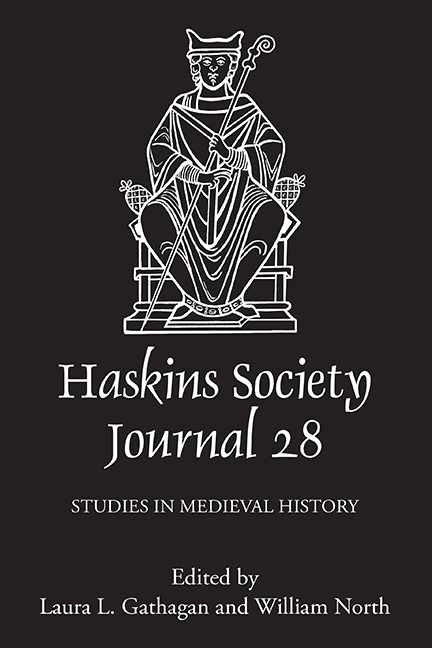Book contents
- Frontmatter
- Contents
- List of Figures and Tables
- Editors' Note
- Abbreviations
- 1 Under the ‘Romans’ or under the Franks? Venice between Two Empires
- 2 Lost and Found: Eadmer's De reliquiis sancti Audoeni as a Cross–Channel Solution to the Canterbury–York Dispute
- 3 Of Lost Libraries and Monastic Memories: Creating the Eleventh-Century Novalesa Miscellany
- 4 The Place of Henry I in English Legal History
- 5 ‘Goliath Thought David Rather Boastful’: Royal Masculinity in Kingless Societies
- 6 Well-Behaved Women? Agnès of Baudement and Agnès of Braine as Female Lords and Patrons of the Premonstratensian Order
- 7 ‘Videmus nunc per speculum’: The Mysticism and Naturalism of the Twelfth-Century imago mundi
- 8 The Norman Kings of Africa?
- 9 Punishing Adultery: Private Violence, Public Honor, Literature, and the Law
9 - Punishing Adultery: Private Violence, Public Honor, Literature, and the Law
Published online by Cambridge University Press: 23 August 2019
- Frontmatter
- Contents
- List of Figures and Tables
- Editors' Note
- Abbreviations
- 1 Under the ‘Romans’ or under the Franks? Venice between Two Empires
- 2 Lost and Found: Eadmer's De reliquiis sancti Audoeni as a Cross–Channel Solution to the Canterbury–York Dispute
- 3 Of Lost Libraries and Monastic Memories: Creating the Eleventh-Century Novalesa Miscellany
- 4 The Place of Henry I in English Legal History
- 5 ‘Goliath Thought David Rather Boastful’: Royal Masculinity in Kingless Societies
- 6 Well-Behaved Women? Agnès of Baudement and Agnès of Braine as Female Lords and Patrons of the Premonstratensian Order
- 7 ‘Videmus nunc per speculum’: The Mysticism and Naturalism of the Twelfth-Century imago mundi
- 8 The Norman Kings of Africa?
- 9 Punishing Adultery: Private Violence, Public Honor, Literature, and the Law
Summary
The early thirteenth-century fabliau Les Tresces tells the story of a knight whose wife takes a lover. Upon discovering the adulterous pair, the husband attempts to accost the lover, but the wife enables his escape. The husband throws his wife out of the house and forbids her to return. However, the wife plans a ruse to fool her husband and return to her home as an unjustly accused woman. She approaches a neighbor woman whom she physically resembles and asks her to pretend to be the adulterous wife and beg the knight to take her back. After much cajoling, the neighbor woman agrees. Though the neighbor was led to believe her efforts would restore the couple's marriage, what takes place is one of the most graphic descriptions of domestic violence within the fabliaux, and indeed within Old French literature as a whole:
Out of the bed the husband surged, never had he a greater urge to beat a woman than to beat the one who knelt before his feet. On each foot he strapped a spur and nothing else, confronting her naked but for the shirt he wore. He came and seized her hair and bore her body down upon the ground. Around her head his fingers wound. He yanked and jerked and pushed and pulled until his hands could hardly hold. A hundred lines of blood he drew across her flanks and belly too, striking and raking with his spurs. … He beat, and kept on beating her and the more he beat, the angrier he got and heaped her with abuse … the woman wailed and sniffled and gulped for he had beaten her to a pulp … her outcry so abused his ears. He became enraged instead and jumped like a wild man from his bed, dripping sweat from grief and anger, then leaped before her with a dagger and cut her tresses off. The shock was so severe for her, it struck her dumb, and she could weep no more. Her heart was weary to the core and almost burst from so much weeping. At last the husband left her … the woman was forced to drag herself half dead [from the house].
- Type
- Chapter
- Information
- The Haskins Society JournalStudies in Medieval History, pp. 167 - 184Publisher: Boydell & BrewerPrint publication year: 2017



